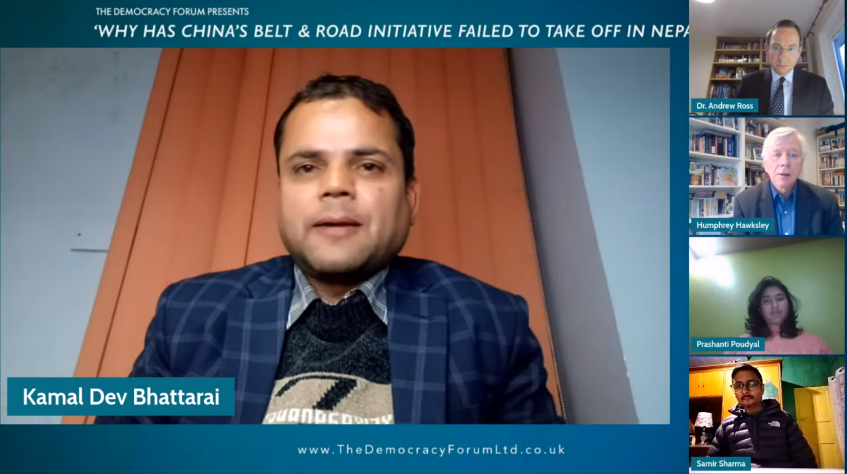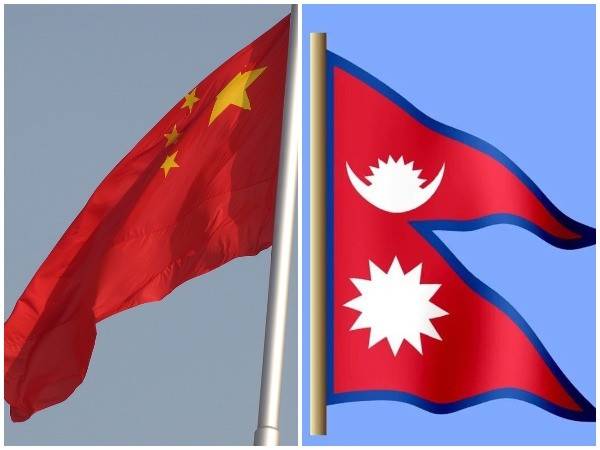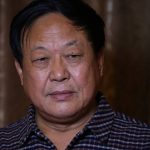Highlighting Nepal’s complex diplomatic ties with the two major powers, China and India, Lord Bruce talked about the difficulties Kathmandu faces in pursuing its foreign policy….reports Asian Lite News
The Democracy Forum (TDF) conducted a webinar titled ‘Why has China’s Belt and Road Initiative (BRI) failed to take off in Nepal.’ During this session, panelists shared their insights and perspectives on the factors contributing to the project’s lack of progress.
All issues encompassing funding and transparency concerns and the nation’s complicated geopolitical position were discussed in the webinar.
The panel included Lord Bruce, Humphrey Hawkesly, Barry Gardiner, Andrew G Ross, Samir Sharma, Kamal Dev Bhattrai, and Prashanti Poudyal.
In June, Nepal’s foreign minister confirmed that not a single project in the country had been carried out under the initiative after China claimed that the Pokhara International Airport would be the BRI’s flagship project.
In the discussion led by Humphrey Hawkesly, TDF President Lord Bruce spoke about the complexities surrounding the Chinese project while providing a recap of recent events.

“In 2017, Nepal signed up for China’s Belt and Road Initiative. However, nothing has been accomplished after six years. No Memorandum of Understanding within the BRI framework was signed by the Prime Minister of Nepal during his eight-day visit to China in September,” said Lord Bruce.
Highlighting Nepal’s complex diplomatic ties with the two major powers, China and India, Lord Bruce talked about the difficulties Kathmandu faces in pursuing its foreign policy.
Highlighting Nepal’s complex diplomatic ties with the two major powers, China and India, Lord Bruce talked about the difficulties Kathmandu faces in pursuing its foreign policy.
In this context, the TDF president mentioned the Millennium Challenge Corporation Nepal Compact, a grant of USD 500 million from the United States for infrastructure projects.
“The MCC posed concerns regarding Nepal’s alignment in the global geopolitical landscape, entangled between the objectives of the United States, China, and India,” said Bruce.
Andrew Ross, a senior lecturer at the University of Dundee, first talked about the Chinese initiative in the broader geopolitical power game and said that the reconstruction of the ancient Silk Route seeks to strengthen Beijing’s economic leadership.
Ross said that the visually appealing projects are making the countries wary. “It is being viewed with considerable anxiety in relation to non-performing assets and the implications of non-meeting debt obligations,” he added.

Prashanti Poudyal, a Research Fellow, cited Nepal’s inability to afford high-interest loans for significant infrastructure projects as a reason behind a cautious and strategic approach by Nepali leaders.
“The BRI loans are much higher than the loans provided by other multilateral organisations. The average interest rate of the BRI projects is 4.2 per cent with a grace period of less than two years and a maturity length of less than ten years,” said Poudyal.
She also added that the experiences of regional neighbours like Sri Lanka and Pakistan acted as a cautionary tale for Nepal.
In the webinar, the complexity of Nepal’s geopolitical situation was also emphasised. Nepal’s reluctance to fully embrace the BRI was linked to concerns about its constitutional obligation of non-alignment.
In the discussion, it was also pointed out that Nepal sees BRI as a discrete project rather than an all-encompassing endeavour, which stops Kathmandu from fully embracing it.
Political instability, a non-friendly atmosphere for investment, and the fear that Chinese interference might lead to financial disaster are some of the reasons behind the non-implementation of Chinese projects in Nepal, the participants noted. (ANI)














